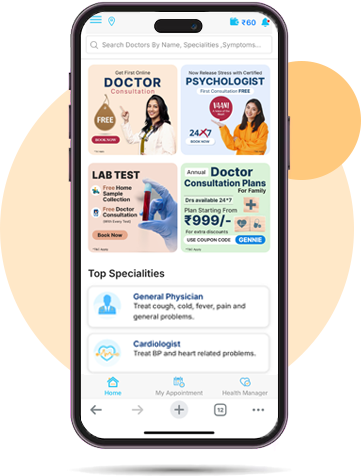Learn How Essential Sleep Hygiene Tips Can Help You Sleep Smarter and Rest Better
November 13 , 2024

Sleep is an integral part of our lives, and it matters how healthily we sleep. Sound sleep leads to a productive tomorrow. As our title says, the more peaceful our sleep, the more fresh and productive we feel. As a student, you might suffer from lack of sleep, fatigue, tiredness, and less productivity. Health Gennie Best Student Healthcare App brings the blog with tips and healthy sleep hygiene to deal with all these.
What is Sleep Hygiene?
Sleep hygiene means adopting habits and environments that help improve the quality of one's sleep. Good sleep hygiene can help one fall asleep quickly and have sound, deep, and restful sleep.
Studies, homework, extracurricular activities, and screen time are significant in students' lives and negatively impact their sleep patterns. Good sleep hygiene is essential for students to perform better in their studies and daily activities.
Benefits of Good Sleep
- Better mental health: Good sleep reduces mental stress and anxiety.
- Improved physical health: Adequate sleep reduces the risk of chronic diseases like heart disease, obesity, etc.
- Improved memory and attention: Sleep revitalizes the brain, enhancing both memory and focus.
- Improves mood: Good sleep keeps the mood stable and positive.
Sleep Hygiene Tips :
- Set a Regular Bedtime and Wake-up Time: Aim to maintain a consistent sleep and wake-up schedule every day, including weekends and holidays.
- Set Up a Comfortable Bedroom: The environment of your bedroom should be relaxed and comfortable. Aim to sleep in a calm, dark, and quiet environment.
- Reduce Screen Time Before Bed: The blue light released by phones, tablets, or TV screens disrupts the sleep hormone. Please don’t use them at least an hour before bedtime.
- Avoid Caffeine and Alcohol: Avoid caffeine (coffee, tea, chocolate) and alcohol after 4 p.m., as they disrupt sleep.
- Adopt a Relaxing Bedtime Routine: Relaxing activities such as reading a book, light stretching, or meditation before bed can help improve sleep.
- Avoid Heavy Meals: Overeating or spicy food before bedtime can cause stomach irritation, leading to trouble sleeping.
- Keep a Separate Study Area and Sleep Area: Keep your study and sleep area separate. Use your bed only for sleeping.
- Stay Active: Exercising regularly throughout the day can improve sleep quality, but avoid heavy exercise right before bedtime.
- Be Mindful About Daytime Naps: Make it short and limit your nap time to 20-30 minutes.
- Address Stress and Anxiety: It is expected to feel stressed due to exam pressure or other reasons. Deep breathing, listening to music, or relaxing can reduce stress.
- If You Can't Fall Asleep, Leave the Bed: If you can't fall asleep within 20 minutes, get up and do a peaceful activity, like reading a book.
- Prepare Your Next Day Before Making Bed: Outlining the next day before going to bed frees up your mind and can improve sleep.
- Take a Break from Studying Before Bed: Take a break from studying at night for an hour before bedtime so that the brain gets some rest. Studying directly before going to bed makes the brain active and can cause difficulty in sleeping.
- Take Some Time: Between study schedules, take time for yourself by following your hobbies or engaging in sports activities. This helps reduce stress and clear the mind for better sleep.
- Use a Sleep Journal: If you can't sleep, write your thoughts in a diary. It provides relief for the mind and frees it from the distractions of the day.
- Slow Your Mind Down: Before bed, try mentally slowing yourself down. Deep breathing, visualization techniques, and mindfulness exercises have been shown to improve sleep.
- Limit Water intake: Drinking too much water can lead to frequent nighttime visits to the washroom, disrupting sleep. Try to slightly reduce your water intake before going to bed.
- Include essential nutrients: A balanced diet, including proper minerals and nutrients in food, helps improve sleep quality. Adequate measure of nutrients like iron, magnesium, and vitamin B improves quality of life.
Additional Benefits for Students From Improving Sleep
- Improved personal relationships: Good sleep improves your mood, allowing you to spend quality time with friends and family.
- Problem-Solving Skills: Good sleep enhances the brain’s creative and problem-solving skills, which are essential for students.
- Performance in sports and physical activities: Lack of sleep reduces reflexes and coordination, while good sleep helps you remain physically active.
What to Do if a Problem Occurs?
If you have persistent sleep problems, consult the Best Psychologist in India at Health Gennie. Sometimes, sleep problems can also be caused by insomnia or other sleep disorders.
Getting good sleep is extremely important because it reduces the stress and pressure of student life. Better sleep hygiene will lead to better overall and psychological well-being.
Common Myths of Sleep Hygiene:
- "I can do well even with less sleep": Many students think they can study well even with less sleep, but this is a myth. Lack of sleep affects attention, concentration, and decision-making ability.
- "I'll make up for the lack of sleep later": Trying to make up for the lack of sleep during the week by sleeping more on weekends is not a good idea. Sleep loss can have long-term effects.
- "Staying up late at night is better for studying": It is common among students but disturbs your circadian rhythm. It is better to make time for studying during the day.
Conclusion:
To summarize, practicing good sleep hygiene is essential for enhancing both physical and mental well-being. By adopting habits that support a restful night—such as maintaining a consistent sleep schedule, creating a relaxing pre-sleep routine, and optimizing the sleep environment—you can significantly improve the quality of your sleep. These small, intentional changes contribute to more restorative rest and set the foundation for increased energy, better focus, and greater daily productivity. Prioritizing sleep hygiene is an investment in yourself, paving the way for a healthier, more fulfilling life. If you or any of your loved ones are struggling with sleep issues, you can directly Book a Doctor Consultation Online at Health Gennie. The top experts will be available to assist you.
Make sleep your priority because the "Better Sleep, Better Grades" rule applies to every student!
Disclaimer:
The information on this blog is not a substitute for any professional medical diagnosis or treatment. The blog contains text, images, or graphics that are solely for informational purposes. Before implementing the information mentioned above, seek the advice of a professional doctor regarding any doubt or question you may have about the medical condition or treatment. Also, take the advice of a professional healthcare provider before making changes in your healthcare routine.











